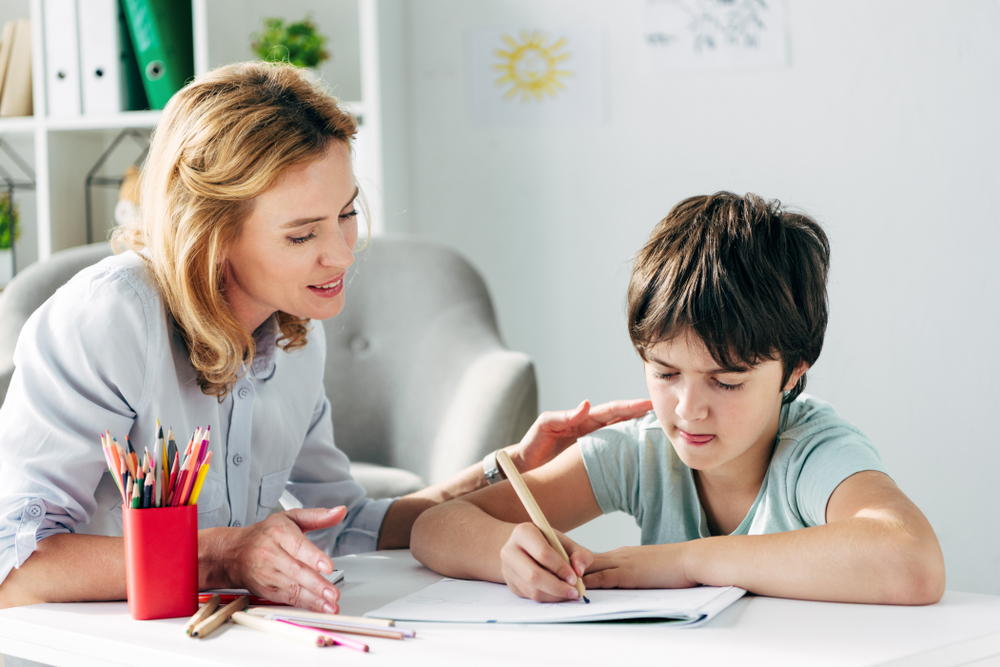 Considering that dyslexia affects between 5% and 10% of the global population, looking for ways to support people right from diagnosis is essential. For children with dyslexia, the world can be a frustrating place, especially when it comes to trying to communicate with their peers. Something that our team is passionate about is identifying dyslexia symptoms across different age groups and providing targeted support. Within children, a huge component of this is improving confidence in communication. In this article, we will explore the ways that dyslexia affects communication in children by looking at the signs to look for and treatments available. Whether you want to find professional help or are looking for ways to help your child with dyslexia at home, we will share advice for everyone.
Considering that dyslexia affects between 5% and 10% of the global population, looking for ways to support people right from diagnosis is essential. For children with dyslexia, the world can be a frustrating place, especially when it comes to trying to communicate with their peers. Something that our team is passionate about is identifying dyslexia symptoms across different age groups and providing targeted support. Within children, a huge component of this is improving confidence in communication. In this article, we will explore the ways that dyslexia affects communication in children by looking at the signs to look for and treatments available. Whether you want to find professional help or are looking for ways to help your child with dyslexia at home, we will share advice for everyone.
What Causes Dyslexia In Children?
One of the reasons that dyslexia can be both hard to diagnose and also to understand is because there are no major reasons for its development. By this we mean that the four types of dyslexia are all hereditary or can develop in anyone based on brain functionality. Research shows that dyslexia is genetic, meaning that those who are affected are born with learning difficulties. However, some professionals have also drawn correlations between issues such as low birth weight, exposure to substances during gestation and premature births and the development of dyslexia in children.
What Are Some Ways That Communication Is Affected For Children With Dyslexia?
One of the things we believe everyone should know about dyslexia is how communication can be made difficult for children. This not only allows people to help those affected in the right way but means that as children develop into adults, they are more likely to have got a handle on what works best for them to alleviate symptoms. Furthermore, understanding how communication is affected can also help parents and caregivers realize if their child may be struggling with dyslexia, as it’s not something that everyone is aware of. It is important to consider that the earliest signs of dyslexia can arise between the ages of 1 and 2 years. The ways that dyslexia affects communication in children are outlined below:
- Recognition of sounds and understanding of phonetics
Phonological awareness directly affects communication in children, as it makes it hard to understand the differences in language. An awareness of this is essential for learning words and correctly forming them, which is the foundation for reading, writing, and talking. This causes frustration in children, as individuals find it hard, if not impossible, to create sentences as a way to express themselves. Furthermore, not having a grasp on phonetics and associated language means that children also find it tricky to perceive and understand information being directed to them.
- Development rates of speech and language
Children with dyslexia will have a slower development rate when it comes to speech, writing and overall understanding of a language. They will have to learn words much more slowly than others and include other methods of improving memory simultaneously. Furthermore, the overall level of language understanding may never reach the same level as those who are unaffected, as the brain simply can’t retain the same level of information. However, thanks to modern learning advances, this isn’t something that needs to hold people back anymore.
- Confidence and self-esteem
Another way that communication is affected in children with dyslexia comes in the form of having low self-esteem. As some children may perceive they are not as intelligent as others, they are likely to be more reluctant to engage in different forms of communication. This is the case even if they are able to. These individuals may also hide certain parts of their personality through fear of being judged, which can be reflected in introverted behavior, which cuts them off from being included in different opportunities.
- Feeling connected to peers
An important part of learning to communicate for children is engaging with peers. This helps them to develop confidence in conversing, plus understanding how to use both verbal and physical body language in different scenarios. Additionally, a percentage of overall communication skills are picked up from peer-to-peer engagements. Those with dyslexia will be more likely to pull out of this situation, meaning their ability to communicate socially is affected.
- Overall memory and the ability to use words in the right order
Children with dyslexia also struggle with remembering how to structure words in a sentence or retaining the actual word itself. They often find themselves trying to source the correct word, which can lead to frustration. The confusion of the order of words is also an issue. This can be in the form of using words in the wrong order or swapping terms out for some that sound similar.
- Ability to speak fluently and confidently
Last but not least, speech fluency is affected in children with dyslexia. Stutters or communication delays result from the brain trying to format the sentence but not being able to find the words as fast as speech can be formed. Another symptom is that children may need to take a pause once they are delivered information before they are able to form a response.
Are There Any Methods Of Helping Improve Communication For Children With Dyslexia?
 If your child’s communication ability is affected by dyslexia, you will be relieved to know there are many coping strategies that support both children and adults.
If your child’s communication ability is affected by dyslexia, you will be relieved to know there are many coping strategies that support both children and adults.
Targeted Therapies
One of the main ways to improve communication in children with dyslexia is to find targeted therapies. These often include speech and awareness methods. Some are targeted at certain areas of development, whereas others will offer a complete approach. It will depend on the service you source and the level of dyslexia that a child is affected by.
Understanding Changing Symptoms
Another way to support this is to understand what common symptoms look like in children. This will allow parents to highlight if new issues are being experienced and to better tailor professional assistance. There are many symptoms of communication frustrations in children, including feeling uncomfortable reading, being slow to interact with materials, mixing up letters and avoiding tasks that involve certain communication styles. By keeping track of any changes, support is made more effective as it’s easier to reprogram a child’s brain earlier on.
Keep Things Clear
This last point might sound simple, but it’s possibly one of the most important. When trying to help children with dyslexia, learning and feedback should always be kept simple. If you try to overload a young learner with complex information, it can have the opposite effect to what is intended. Instead, even if a child is learning at a slower rate than recommended, it’s best to stick to methods that they are benefiting from. You may even find that if children are left to learn at their own pace, even with a dyslexia diagnosis, they can still reach the same levels of overall communication development as their peers as they get older.
What Treatments Are Available From The Brain Workshop?
 Hopefully, after reading this blog, you will feel less worried about your child if they are struggling with dyslexia-induced communication problems. There are many ways to help a child develop which all mean that they can still live a happy and fulfilled life. At The Brain Workshop, we offer professional dyslexia help focused on creating bespoke methods of treatment. We take the time to assess children and create unique methods of treatment which ensure they feel comfortable and supported at all times. We are proud to report this has already helped many children develop their own styles of confident communication which are seen to improve confidence and academic abilities. If you want to learn more, you can view our FAQs or check out our recent media. With the right help, communication doesn’t have to be a weakness for children with dyslexia.
Hopefully, after reading this blog, you will feel less worried about your child if they are struggling with dyslexia-induced communication problems. There are many ways to help a child develop which all mean that they can still live a happy and fulfilled life. At The Brain Workshop, we offer professional dyslexia help focused on creating bespoke methods of treatment. We take the time to assess children and create unique methods of treatment which ensure they feel comfortable and supported at all times. We are proud to report this has already helped many children develop their own styles of confident communication which are seen to improve confidence and academic abilities. If you want to learn more, you can view our FAQs or check out our recent media. With the right help, communication doesn’t have to be a weakness for children with dyslexia.






